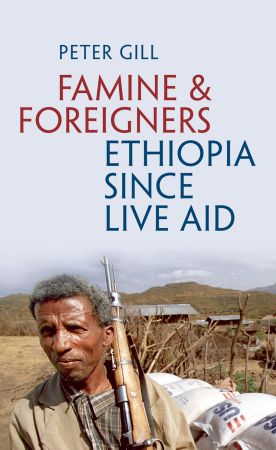The myth of Ethiopia’s “natural” disasters
 As Amartya Sen has shown, famines in our times are not true natural disasters, but more often the consequence of bad governments and their bad policies. Revisiting the era of Live Aid for a book review in The New Republic, David Rieff gives evidence of how the Ethiopian famine was framed as a natural disaster rather than a political one, so as not to “complicate” the picture for viewers:
As Amartya Sen has shown, famines in our times are not true natural disasters, but more often the consequence of bad governments and their bad policies. Revisiting the era of Live Aid for a book review in The New Republic, David Rieff gives evidence of how the Ethiopian famine was framed as a natural disaster rather than a political one, so as not to “complicate” the picture for viewers:
… Michael Buerk’s first BBC report from the famine zone opened with the words, “Dawn, and as the sun breaks through the piercing chill of night on the plains outside Korem, it lights up a biblical famine, now, in the twentieth century.” Apart from the facts that it was dawn and there was a famine, nothing in what Buerk said was right. It was precisely not a biblical famine, in the locusts/great flood/visitation-from-God sense that Buerk was evoking. It was, rather, a man-made famine—the direct and in all likelihood inevitable result of deliberate policies in Addis Ababa by the Stalinist government of Mengistu Haile Mariam. That is to say, it was a famine that was more likely to occur in the twentieth century—the heyday of man-made famines—than at any other time in human history.
The book under review, by Peter Gill (also reviewed by Bill in the Wall Street Journal), takes stock of what’s happened and what hasn’t in Ethiopia since Geldof et al admonished us in 1984 to “pray for the other ones” living in a “world of dread and fear/ Where the only water flowing/ is the bitter sting of tears”:
[Gill’s] book is not just a look back at the great controversies of the famine years of the mid-1980s, but also an attempt to understand whether, as he puts it, “beyond the challenges of famine forecasting and hunger relief, are there [now] Ethiopian political institutions and policies in place to deliver the transformation known as ‘development’?”
The elision of the political causes of human suffering in Ethiopia has turned out to be a trend with more staying power than a few of the pop singers in Band Aid. Western governments, donors and academics have kept on admiring and abetting Meles even as he presided (this year) over an election of which Human Rights Watch said “the most salient feature ... was the months of repression preceding it,” and called the government’s performance “multi-party theater staged by a single party state.”
As Gill points out, in the development world, Sen’s celebrated argument in Development as Freedom that “no famine has ever taken place in the history of the world in a functioning democracy,” and its corollary, “that a free press and an active political opposition constitute the best early-warning system a country threatened by famines can have,” is considered to be proved, no longer open to dispute. But for Meles, as Gill reports, it is a neo-liberal myth, “not validated by historical facts.”
And today, despite some success in growing the Ethiopian economy:
[T]he food security of poor Ethiopians is anything but more assured today than it was a decade ago, and it is anything but clear that the country is any less dependent than it ever was on food aid from foreign donors.
--
 From Aid to Equality
From Aid to Equality

